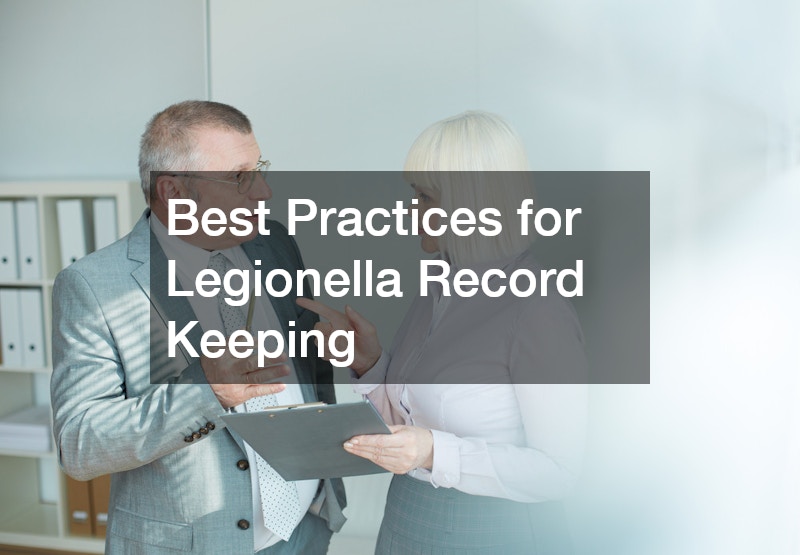Maintaining proper records for Legionella is crucial for ensuring compliance with health regulations and safeguarding public health. This article explores the best practices for Legionella record keeping, addressing common concerns and effective strategies for businesses and facilities.
What Records Should Be Kept for Legionella Management?
Essential Documentation
Proper Legionella management begins with comprehensive record keeping that includes risk assessments, maintenance schedules, and sampling results. These records provide a detailed account of the measures taken to prevent and control Legionella outbreaks.
It is essential for businesses to update these documents regularly to reflect any changes in water system management or environmental conditions.
Risk assessments are a cornerstone of Legionella management, as they identify potential hazards and outline appropriate control measures. Maintenance schedules ensure that all equipment is serviced and functioning correctly, minimizing the risk of Legionella growth. Sampling results offer proof of water quality, demonstrating compliance with health standards and helping diagnose any deviations from accepted safety levels.
In addition to maintaining these records, businesses should have a clear process for reviewing and analyzing data to identify patterns or recurring issues. Regular reviews can enhance the effectiveness of Legionella prevention strategies and mitigate potential risks before they escalate. Careful documentation also supports transparency and accountability, providing evidence of proactive management efforts.
Legal Requirements
Legionella record keeping is not only a best practice but also a legal requirement in many jurisdictions. Regulations often mandate that businesses maintain written records of their Legionella risk management activities. Compliance checks by health authorities typically involve reviewing these records to ensure that the necessary precautions and remedial actions are in place.
The Health and Safety Executive (HSE) in the UK, for example, requires businesses to keep detailed documents concerning Legionella control. This includes evidence of risk assessments, management plans, and records of equipment maintenance and inspection. By understanding and adhering to these legal obligations, businesses can avoid fines or legal action related to inadequate Legionella control.
Regularly updated records serve as a safeguard against potential liabilities and can protect businesses from consequences arising from negligence. Keeping accurate and comprehensive records is also essential for responding promptly to any queries or concerns raised during inspections or audits. Therefore, businesses should allocate sufficient resources to ensure compliance with all legal requirements related to Legionella record keeping.
Retention Periods
The retention period for Legionella records varies depending on the type of documentation and legal requirements. Generally, risk assessments and management plans should be retained for at least five years. Maintenance records and sampling results may have shorter retention requirements but should still be held long enough to support compliance with regulatory guidelines.
Keeping records for the required duration ensures that businesses can provide historical data when needed, allowing for thorough investigations in case of Legionella outbreaks. It also facilitates ongoing monitoring and trend analysis of water quality and system performance over time. Understanding and adhering to these retention guidelines is crucial for maintaining regulatory compliance and demonstrating due diligence in Legionella management.
Businesses should also consider retaining records for longer than the minimum required period if this provides additional value for audit, analysis, or tactical planning purposes. Digital record-keeping systems can ease the storage burden by organizing and safeguarding documents over extended periods. By implementing robust record retention policies, businesses are better prepared to handle audits and potential legal challenges.
How Can Technology Enhance Legionella Record Keeping?
Digital Record Keeping Systems
Transitioning to digital systems for Legionella record keeping offers significant advantages over traditional paper-based methods. Digital systems can enhance data organization, streamline record retrieval, and reduce the risk of lost or misplaced documents. They also offer superior integration capabilities, enabling seamless sharing of relevant data across different departments or with external stakeholders.
By adopting digital solutions, businesses can improve their oversight of Legionella management activities. Automated alerts and notifications can help track compliance deadlines and ensure that scheduled tasks are completed on time. Digital records also facilitate more sophisticated analyses, allowing for early detection of trends or issues that may need attention.
Moreover, digital systems can provide environmental benefits by reducing the need for paper, contributing to sustainability goals. While initial setup costs may be a concern, the long-term efficiencies gained often justify the investment. As businesses increasingly move towards digital transformation, integrating Legionella record keeping into this process can lead to more effective and efficient management.
Data Security and Accessibility
Ensuring that digital Legionella records are secure and accessible is paramount. Secure platforms protect sensitive information from unauthorized access, data breaches, or cyber attacks. Businesses must implement robust security measures, such as encryption and multi-factor authentication, to safeguard their records.
Equally important is maintaining data accessibility for authorized personnel, especially during audits or inspections. Record management systems should offer user-friendly interfaces so that information can be easily accessed and shared when needed. Proper training of staff in using these systems can further enhance data management efficiency and prevent access-related issues.
Balancing security with accessibility requires a strategic approach to managing digital records. Regular security audits can help identify vulnerabilities and ensure that protections are up-to-date. By prioritizing both security and accessibility, businesses can optimize their digital Legionella record keeping systems and maintain compliance with regulatory standards.
Automating Records and Alerts
Automation technology can greatly enhance the efficiency of Legionella record keeping by reducing manual intervention and the potential for human error. Automated systems can monitor water temperature and quality, automatically logging data and alerting personnel if readings fall outside acceptable ranges. This proactive alert system enables quicker response times to potential issues, mitigating risks of Legionella outbreaks.
Scheduled maintenance tasks can also be managed more effectively through automation, ensuring that inspections and servicing occur at the appropriate intervals. Systems can generate reminders for required actions, such as water testing or equipment inspection, ensuring that no aspect of the Legionella management plan is overlooked. Automation thus serves as a critical tool in maintaining consistent and thorough Legionella control.
For businesses juggling multiple compliance responsibilities, automation simplifies the process by reducing administrative burdens. It provides a reliable framework for documenting all management activities, enabling more effective oversight. Hence, investing in automation technology can lead to more robust Legionella management processes and improved compliance outcomes.
Adopting the best practices for Legionella record keeping is vital for maintaining regulatory compliance and ensuring the safety of building occupants. By understanding what records to maintain and how technology can enhance these processes, organizations can significantly improve their Legionella management strategies. Implementing comprehensive record-keeping practices and leveraging technological advancements are essential steps towards effective Legionella control and public health protection.
.





